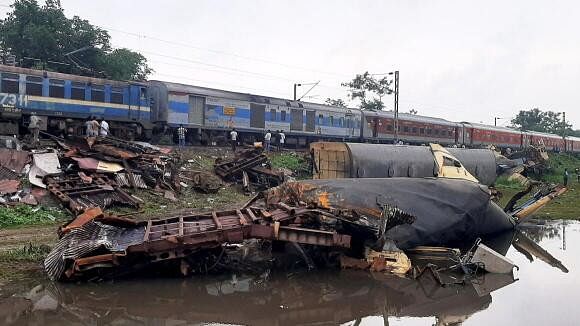
Wreckage of trains near the accident site a day after the collision between the Kanchanjunga Express and a goods train, near Rangapani railway station
Credit: PTI Photo
New Delhi: The Commissioner of Railway Safety (CRS) has recommended implementation of the Automatic Train-protection system (KAVACH) on top priority in the railway network.
The CRS in its probe report into the Kanchanjunga Express accident that occured on June 17 in West Bengal's Darjeeling district, expressed concern over frequent failure of automatic signaling systems and asked the railways to rectify it.
Ten passengers died and 41 were injured when a fast moving goods train hit the rear of the Kolkata bound Kanchanjunga Express. KAVACH was not installed on the route where the accident took place.
Classifying the accident under the "Error in Train Working" category, the CRS said there was "inadequate counselling of loco pilots and station masters about train operation in automatic signalling territory creating misinterpretation and misunderstanding of rules."
It said the large number of signalling failures in automatic signalling territory is a cause of concern and should be taken up with those concerned to improve the reliability of the system.
"The occurrence of as many as 208 cases of Signal Passing at Danger (red signal overshooting) from 1.4.2019 to 31.03.2024, out of which 12 cases resulted in collision, highlights the limitations of preventive measures taken by zonal railways (counselling of loco pilot/assistant loco pilot, safety drives, etc.)," the CRS said.
The CRS said since automatic signalling was introduced in January 2023, it was necessary that all rules applicable to automatic signalling are implemented at the field level.
"This underscores the need for implementation of the Automatic Train-protection system (KAVACH) on top priority. Use of non-signalling-based systems such as Artificial intelligence-based detection of the RED aspect of the signal and providing an early warning to the loco pilot/GPS-based anti-collision systems shall be explored for provision in locomotive cabs across Indian Railways in non-ATP (automatic train protection) territory," it said.
The report also said that the loco pilot and assistant loco pilot of the goods train, which rammed into Kanchanjungha Express, had taken a rest for over 30 hours.
The probe revealed that the goods train was moving at the speed of 75 kmph when the driver applied an emergency brake to bring it down to 40 kmph just before the collision.
The probe found that a "wrong paper authority" or T/A 912 to cross defective signals had been issued to the loco pilot of the goods train involved in the crash. The paper authority failed to specify the speed the goods train should adhere to while crossing the defective signal.
